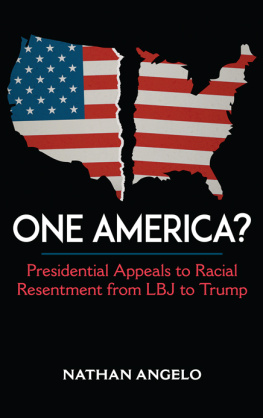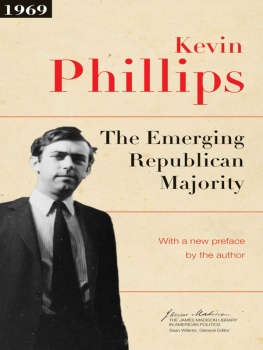In Race Against Time: The Politics of a Darkening America, Keith Boykin provides us with the insights of someone who is an eyewitness to history. This is history we have made together and lessons Boykin recommends to help shape the future.
Donna Brazile, former chair of the Democratic National Committee
In evocative fashion, and through the depth of his personal experiences at the highest levels of American politics, Keith Boykin traces the parameters of Americas never-ending civil war, from the shock of Clintons Black-voter-driven presidency though Bush and Obama and the white nationalist nightmare of Donald Trump. Race Against Time is essential reading at a calamitous time.
Joy Reid, host of MSNBCs The ReidOut
With clear insights and provocative analysis, Keith Boykin showcases why he is one of the countrys foremost experts on race and politics in America. This book is timely, relevant, and important.
Leah Wright Rigueur, associate research professor at Johns Hopkins University
Race Against Time is Keith Boykins best book yet in a long list of books and anthologies that have helped define what cultural criticism is. This book is also an account of what it means to be overlooked in a capitalist landscape that denies the existence and contribution of Black queer citizens. What floors me is that Boykins geniusfrom all the political and racial history from Reconstruction onward, to his well-wrought recounting of the antics of US presidents from Reagan to Trumpstill allows him to remain a man of hope and a writer that affirms the spirit in essays that speak to us as a comforting brother would.
Jericho Brown, author of The Tradition
Copyright 2021 by Keith Boykin
Cover design by Pete Garceau
Cover photograph Leandro Crespi / Stocksy
Cover copyright 2021 by Hachette Book Group, Inc.
Hachette Book Group supports the right to free expression and the value of copyright. The purpose of copyright is to encourage writers and artists to produce the creative works that enrich our culture.
The scanning, uploading, and distribution of this book without permission is a theft of the authors intellectual property. If you would like permission to use material from the book (other than for review purposes), please contact permissions@hbgusa.com. Thank you for your support of the authors rights.
Bold Type Books
116 East 16th Street, 8th Floor, New York, NY 10003
www.boldtypebooks.org
@BoldTypeBooks
First Edition: September 2021
Published by Bold Type Books, an imprint of Perseus Books, LLC, a subsidiary of Hachette Book Group, Inc. Bold Type Books is a co-publishing venture of the Type Media Center and Perseus Books.
The Hachette Speakers Bureau provides a wide range of authors for speaking events. To find out more, go to www.hachettespeakersbureau.com or call (866) 376-6591.
The publisher is not responsible for websites (or their content) that are not owned by the publisher.
Library of Congress Cataloging-in-Publication Data
Names: Boykin, Keith, author.
Title: Race against time : the politics of a darkening America / Keith Boykin.
Description: First edition. | New York, NY : PublicAffairs ; New York, NY : Bold Type Books, 2021.
Identifiers: LCCN 2021006571 | ISBN 9781645037262 (hardcover) | ISBN 9781645037293 (ebook)
Subjects: LCSH: RacismUnited StatesHistory. | African AmericansPolitics and government21st century. | African AmericansSocial conditions21st century. | United StatesRace relations21st century. | United StatesPolitics and government21st century.
Classification: LCC E184.A1 B695 2021 | DDC 305.800973dc23
LC record available at https://lccn.loc.gov/2021006571
ISBNs: 978-1-64503-726-2 (hardcover), 978-1-64503-729-3 (ebook)
E3-20210813-JV-NF-ORI
T he year began in a cold, dreary vestibule of a former womens prison in Mexico City. A few minutes past midnight in the first hour of 2020, I walked through an open cage, past a row of locked jail cells and into the unusual venue of the New Years Eve party to which I had been invited. I watched young people in jeans and T-shirts dancing to house music and nonbinary stage performers gyrating their bodies on pedestals. This was not the Mexico of the American-tourist stereotypes of mariachi bands and wide-brimmed sombreros. Nor was it the Mexico that Americas current president had described when he first launched his campaign. It was a country that was evolving with modern times, much like ours, and it reminded me just how much that change frightened so many people in my own country.
I had not expected to start the new year in this space, but like so much of what would happen in 2020, things did not work out as planned. Twelve months of covering an unwieldy Democratic presidential campaign and a pre-Christmas presidential impeachment left me racing to catch my breath in the final days of December 2019. As a reward to myself, I booked a trip to Mexico to relax and prepare for the year to come. I was eager to try a nontraditional celebration venue as a symbol of my openness to the possibilities of a new year, and as I walked from one dark caged room to another, I interpreted my New Years Eve adventure as a sign that the year ahead might also be filled with exhilarating new experiences. But, perhaps, I considered later, it was actually an omen that I would soon find myself in jail.
Some time after I woke up from my hangover on New Years Day, my travel partners convinced me to take an Uber to the Lindavista neighborhood for yet another unusual activity. This involved a Mexican shaman who cleansed my body with burning sage and instructed me to kneel in front of an igloo-shaped heat lodge and ask metetl, the god of duality, for permission to enter the temazcal. I had never heard of any of these things before, but I gamely went along, crawling shirtless into the cramped space of the igloo until the tiny doors were closed, and I found myself suffocating from the hot, stifling steam of the volcanic rock in the pitch-black chamber.
A few minutes into the ceremony, I panicked and demanded to leave. The shaman tried to calm my nerves, but I was too frightened to relax. I clumsily stepped over the four other people in the temazcal, crawled my way out the door, and exhaled when I finally stood alone in the daylight. When the shaman came out to check on me later, I explained that I have claustrophobia and could not return for the remainder of the forty-minute ceremony. We had a brief discussion and negotiated a compromise. I agreed to return, but only if I could sit closest to the exit with my hand on the door. That simple technique allowed me to relax and survive the remainder of the ordeal. I had no idea at the time, but this experience would also serve as a valuable lesson for the calm I would need to call upon to face the challenges of 2020.
Two days later, I loaded my bags into a car to the airport, as the trip came to an end. I knew I was returning to political drama in the United States that I had successfully avoided for seven days, but I did not know that I, along with everyone else on the planet, would soon find myself unable to travel to international destinations. As the car drove past Parque Mxico, I said goodbye to my peaceful week in our rental apartment in the quiet neighborhood of La Condesa, and I braced myself for the year to come.
Shortly after I arrived home in New York, I started feeling the effects of a strange illness so serious that it left me contemplating my own mortality. For several days, I left the door of my Harlem apartment locked but unlatched in case a friend with a key needed to rescue and transport me to the hospital. With the aid of the Internet, I self-diagnosed my condition as everything from cancer to Montezumas Revenge, but I stubbornly refused to see a doctor because I had forgotten to renew my health insurance on the Affordable Care Act exchange. I would be without coverage until February 1.



